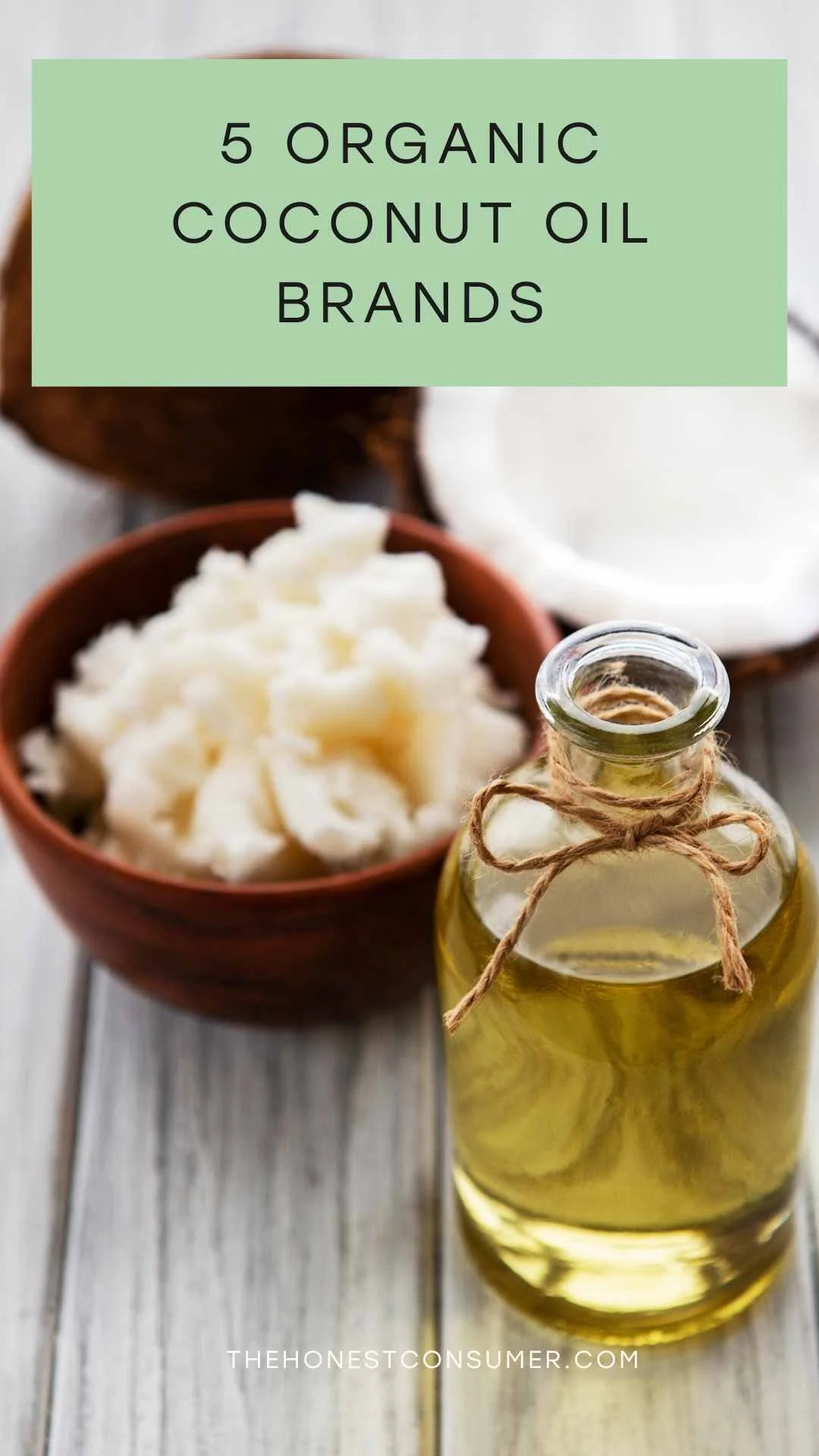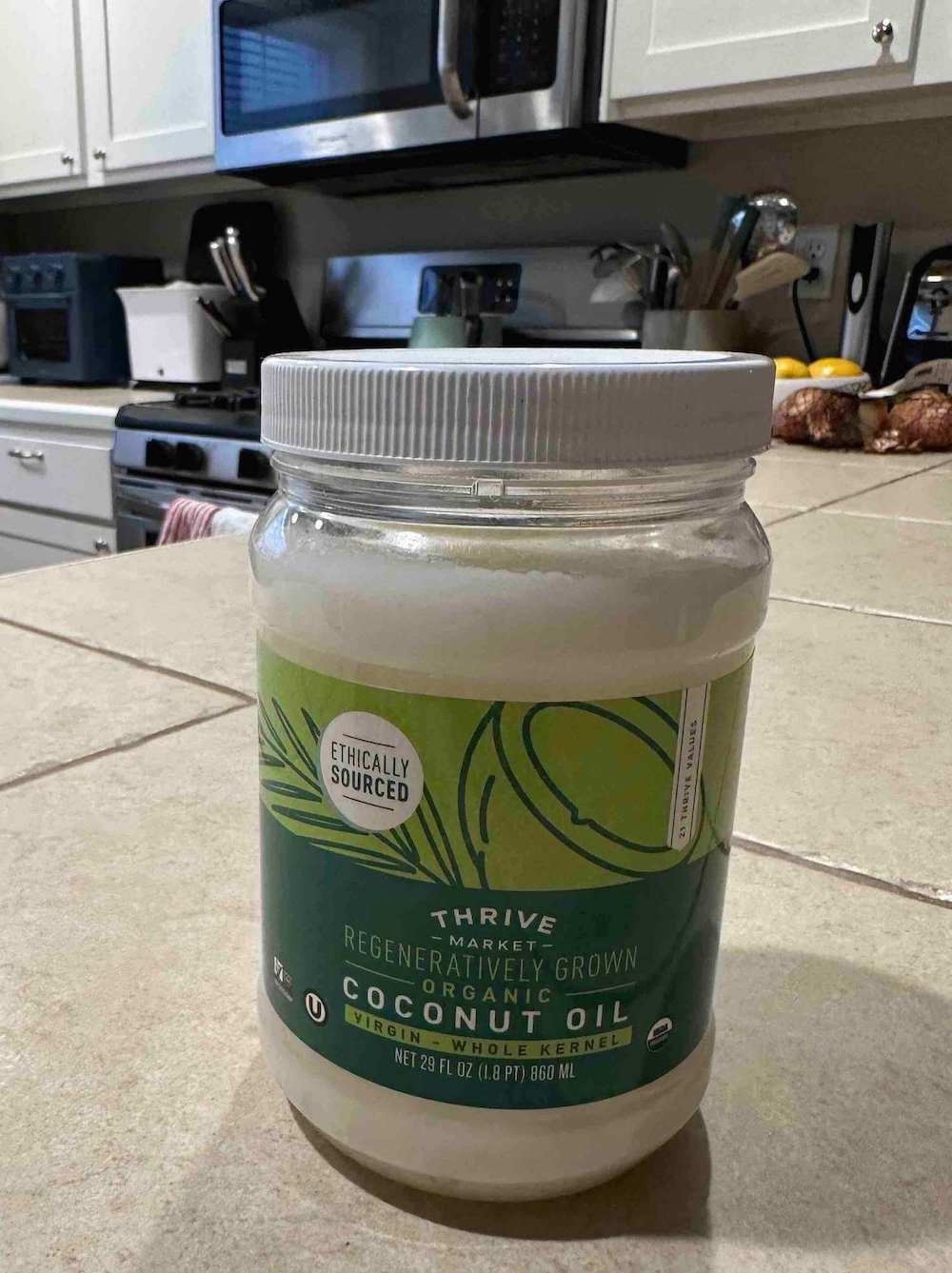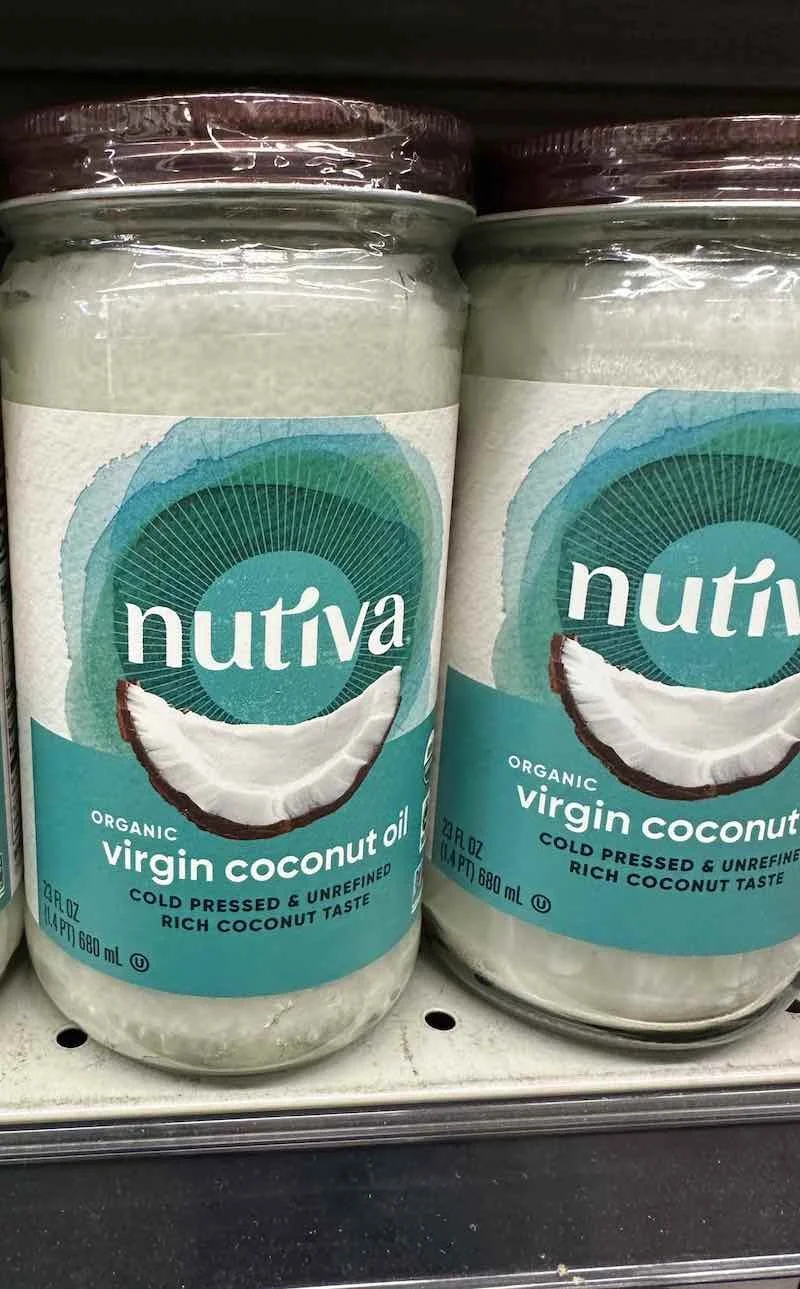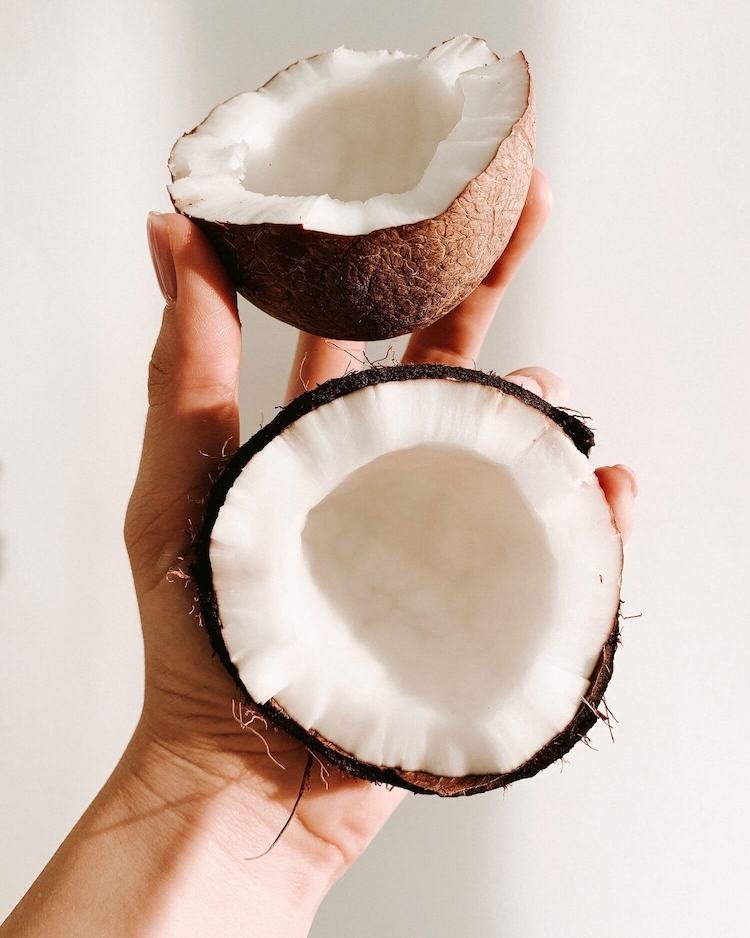The 6 Best Organic Coconut Oils of 2024
Coconut oil is a popular kitchen staple used for cooking and even sometimes skincare! Choosing organic coconut oil can be a great way to make your pantry a little more sustainable.
We’re starting off with a list of the best organic coconut oil brands and then exploring what coconut oil is along with some potential benefits.
Pin this organic food guide for later!
This post does contain some affiliate links. If you decide to make a purchase The Honest Consumer may receive a commission at no additional cost to you.
6 of the Best Coconut Oil Brands that are Organic
Here are some amazing high quality organic coconut oil brands to try! I’ve included a few of my personal favorite!
Thrive Market’s Coconut Oil made from ethically sourced coconuts
Price Range: $9-$21
Thrive Market is an online marketplace for organic, healthy, and sustainable groceries. They carry their own line of products along with other brands.
Their store brand of coconut oil is organic, unrefined, cold-pressed virgin coconut oil. It is made from ethically sourced coconuts from a small farm in the Philippines and Non-hydrogenated & free of hexane.
Thrive’s coconut oil can be purchased in a variety of sizes 54 ounces for $21 or 15 ounces for $9.
Why I Recommend This Brand: This is my personal go-to brand for organic coconut oil. I use it in cooking and baking regularly. It’s always a reliable high quality product and I love that it’s regeneratively grown too!
365’s Unrefined Virgin Organic Coconut Oil
Price Range: Around $8
Certified USDA Organic, 365’s unrefined virgin coconut oil is made using an expeller press. This means it is processed mechanically and contains no solvents or chemicals, resulting in a higher-quality oil. 365’s coconut oil is also vegan and great for stir-fries and smoothies.
You can purchase this online or at any Whole Foods grocery store near you or online. This organic coconut oil can be purchased for around $8 per 14 ounce jar.
Why I Recommend This Brand: I have used this coconut oil in my cooking and baking! It is great quality and I would purchase again.
Dr. Bronner’s Regenerative Organic Certified Coconut Oil
Price Range: Around $16
Starting as a soap maker, Dr. Bonner has expanded to include lotions, balms, hair care products, pure-castile soap, and toothpaste. Dr. Bonner also sells coconut oil that is Regenerative Organic Certified™.
Their coconut oil is expeller pressed from carefully dried coconuts and made using regenerative organic practices like mulching, composting, and intercropping.
It is available as whole kernel (with the brown inner skins left on) and white kernel (with the skins removed).
If you're someone who does not love coconut flavor, you can still benefit with these natural products for your skin!
Why I Recommend This: I appreciate that Dr. Bronner’s coconut oil comes in a glass jar instead of the typical plastic jar! AND I’m happy to see they have multiple third party certifications including USDA Organic & Regenerative Organic.
Kirkland’s Bulk Organic Coconut oil
Cold-pressed, unrefined, and chemical-free, Kirkland’s virgin coconut oil is USDA Organic certified. It can be used as an alternative to butter on toast and is great for popcorn and sautéing vegetables. You can also pop it into your morning smoothie.
This is an excellent choice for the budget conscious, as you can buy in bulk with a Costco membership in stores or online. Their organic coconut oil can be purchased for around $28 for 84 ounces.
Why I Recommend This Brand: It can be tricky to find organic coconut oil in bulk. This is easy to find at Costco and a pretty good deal if you use coconut oil frequently.
Nutiva’s Coconut Oil & Wholesome Foods
Price Range: $10+
Committed to producing wholesome, organic foods, Nutiva offers a range of culinary oils including coconut. Their virgin coconut oil is ideal for sautéing and baking and is vegan-friendly. Another vegan option is their coconut oil buttery flavor.
Their all-purpose coconut oil, also great for cooking, is expeller-pressed and steam-refined without chemicals.
There’s also the liquid coconut oil made without any chemicals or filler oils that remains liquid at low temperatures and can be used for sautéing, baking, salads, smoothies, and popcorn.
All Nutiva’s products are USDA Organic certified. Nutiva offers a range of different sizes and price points starting at around $10 for a 15 ounce jar.
Why I Recommend This Brand: While I haven’t personally tried Nutiva’s coconut oil, I’ve tried plenty of other products from this brand. Their products are always high quality. I appreciate that this coconut oil comes in a glass jar too!
Viva Naturals Organic Products for Health & Wellness
Price Range: Around $14+
Viva Naturals is committed to health and wellness through their range of organic foods. They also offer supplements and beauty products.
Their extra virgin coconut oil is cold-pressed and unrefined and perfect for baking, frying, and sautéing in the kitchen, while also working as a great skin and hair moisturizer. It is certified USDA Organic, kosher, and gluten-free.
Viva Natural’s coconut oil can be purchased for around $14 for a 16 ounce jar.
Why I Recommend This Brand: Viva Naturals products can easily be found at health stores. I appreciate that their coconut oil hold multiple third party certifications including USDA, gluten free, keto, paleo, and more!
What is Coconut Oil?
Coconut oil is a tropical oil derived from the nut of the coconut palm. Solid at room temperature, it is 100% fat, with more than 80% being saturated fat.
It is often consumed in a melted, liquid form.
The oil is made by pressing mature coconut meat from fresh coconuts to make virgin coconut oil or dried coconut meat (known as copra) to make refined coconut oil.
Virgin coconut oil and unrefined oils from coconut do not undergo additional processing or heat treatment, they are just pressed as an oil extraction process.
One of the upsides of coconut oil is its versatility. It can be used for baking, frying, and sautéing in the kitchen.
You can use it to pop corn or add it to coffee and smoothies.
Beyond the kitchen it also has many uses. It’s well known as a skin and hair mask and is often used to make facial masks, tame frizz, and treat dandruff. It also serves as lip balm.
Adding natural coconut oil to your beauty routine can be beneficial. It can even reduce the symptoms of eczema. When it comes to hair and skin, it has many benefits. But what about consuming it in our food.
Potential Health Benefits of Coconut Oil
Coconut oil can be a great cosmetic addition, because it improves skin barrier function and repair and protects against hair damage by making hair stronger and more flexible.
Coconut oil has also been shown to have anti-inflammatory, antimicrobial and antioxidant properties. However, just like with any product coconut oil has its downfalls and should be used in moderation.
More research into the health benefits of coconut oil is needed and the research needs to be better contextualized.
Coconut oil is a quick source of energy due to the presence of MCT oil (medium-chain triglycerides, a type of saturated fat) which your body can absorb and use faster than other types of saturated fat.
However, this is still considered one of the “bad fats” and its consumption should be limited to less than 10% of the day’s calories.
Consuming coconut oil and its medium-chain fatty acids like lauric acid increases levels of LDL cholesterol (which has been known as the bad cholesterol), increasing the risk of heart disease.
While it does not raise it more than butter would, it does raise it more than unsaturated fats like olive oil. The American Heart Association (AHA) recommends replacing saturated fats, like coconut oil, with unsaturated fats.
Heart health claims may have come about in part because countries where people eat a lot of coconuts have low rates of cardiovascular disease.
But, it’s important to look at the full picture: people in these countries (such as India and the Philippines) consume diets rich in fiber and low in sugar and processed food.
They also eat coconuts differently, consuming the whole coconut and not merely the processed oil typical in Western diets.
That’s not to say coconut oil is without its advantages.
It remains stable under high heat and has a high smoke point, so it’s less likely to oxidize during cooking and create harmful compounds like free radicals.
It may even improve dental health through a process known as oil pulling, swishing coconut oil around your mouth like a mouthwash, protecting against cavities and gingivitis.
However, this should not replace your regular dental routine and check-ups. Similarly, in the kitchen, coconut oil should be used as an occasional alternative not a replacement.
If you’re going to use coconut oil, shop for virgin and organic varieties as these are less processed and contain fewer or no additives and chemical solvents such as hexane.
Organic coconuts also do not make use of GMOs or pesticides.
However, coconut oil is often inherently quite organic because it does not require a lot of pesticides, and polyculture is sometimes practiced when growing coconuts, making it a more eco-friendly choice too.
Environmental Impacts & Sustainability of Coconut Oil
Coconut oil’s eco-friendliness was challenged a couple of years ago in a paper comparing its environmental impact to that of palm oil, claiming the former was worse for biodiversity.
This sparked intense debate, with the paper called out as misleading and acting as a diversion from the palm oil industry’s multiple problems.
Making coconut oil has its problems too of course, such as the clearing of land leading to habitat destruction and biodiversity loss.
But the production of coconut oil can be more sustainable and eco-friendly when, as mentioned, it does not use pesticides and is grown by small-scale farmers in polycultures with other crops like coffee, cacao, and banana.
This makes it preferable to destructive monoculture practices.
Furthermore, coconuts are not only harvested for pure coconut oil.
Waste is avoided by using the rest of the coconut to make other by-products such as coconut water, consumable fresh coconut meat, using copra cake for animal feed, husks for rope, and sap as a sweetener.
Nevertheless, there’s no harm in moderating your use of coconut oil, especially considering that its health benefits have been overstated. Seek organic and fair trade options and alternate its use with other oils.
Hopefully this article helped further your knowledge on coconut oil and introduce you to some of the best organic brands, so you can make the most educated choice for you & your family.
For more ethical & sustainable fashion tips be sure to follow The Honest Consumer on social media, subscribe to our newsletter, & check out the Ethical & Sustainable Brand Directory.























